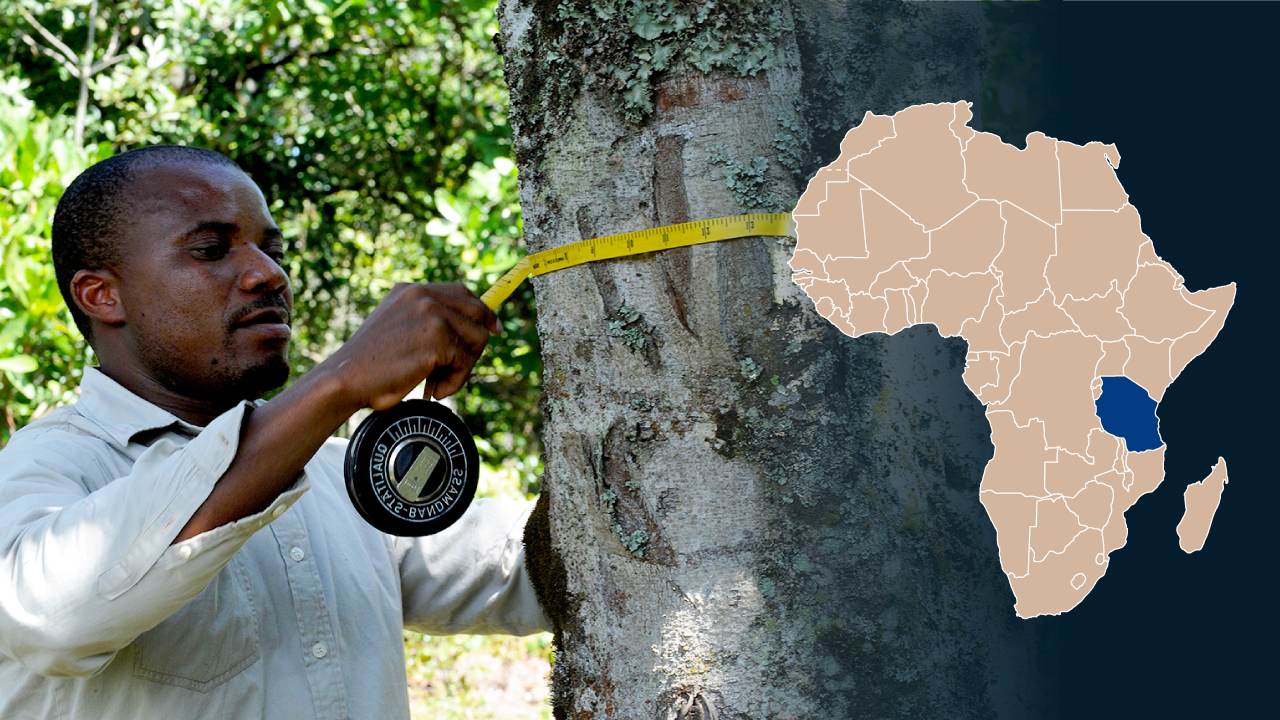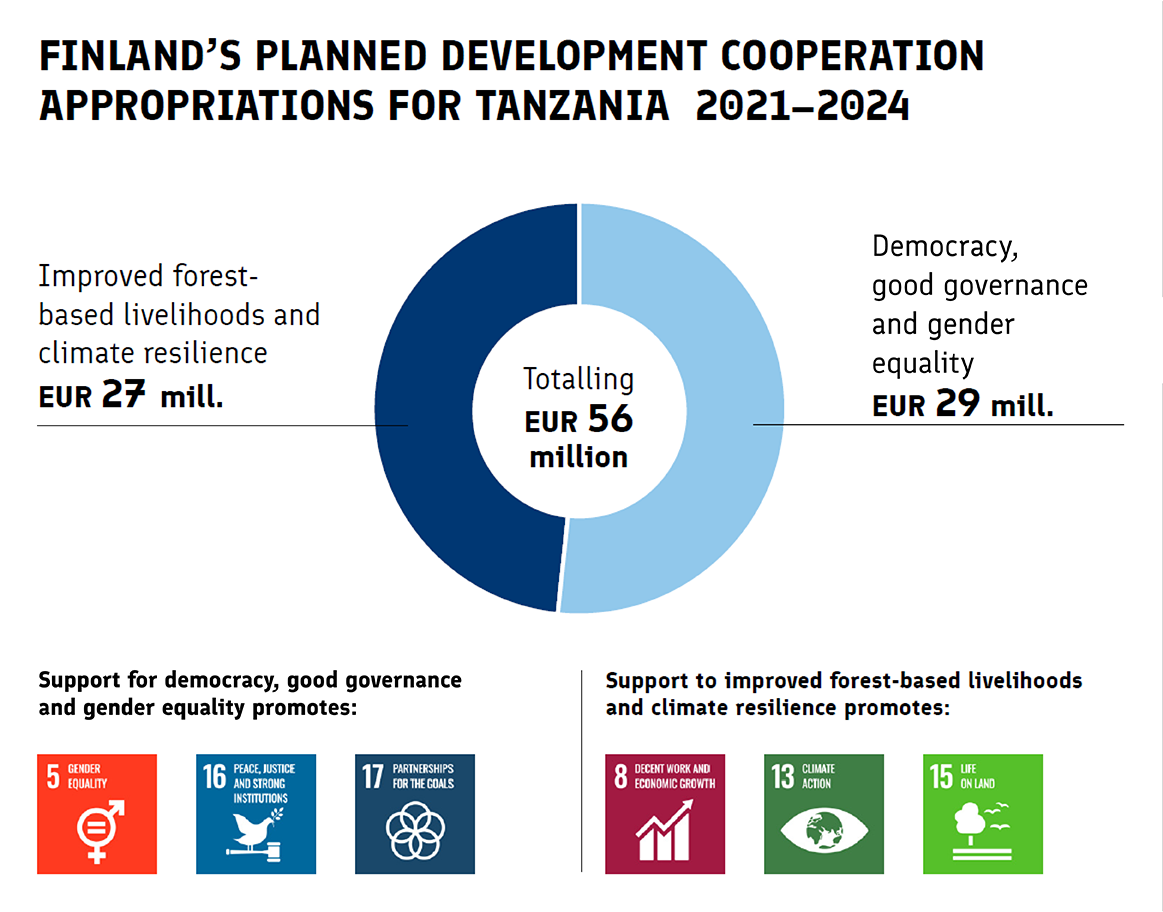Finland’s relations and development cooperation in Tanzania
Finnish development cooperation in Tanzania supports good governance and gender equality, strengthens forest-based livelihoods, and improves climate resilience.

Cooperation in the Tanzanian forestry sector strengthens ecosystems and climate resilience, and promotes the creation of forest-based jobs. It is natural to continue work in this sector, because Finland and the UN have previously carried out a forest inventory and developed a software for handling forest data. The software is currently used in more than 100 countries. Picture: FAO / Simon Maina
Tanzania has been a stable and democracy-oriented country for a long time. Its economy has grown rapidly throughout the 21st century, contributing to the reduction of poverty. In recent years, a growing number of Tanzanians have got access to free education and electricity.
Despite the progress that has been made, approximately one out of four Tanzanians still live below the national poverty line. Rapid population growth, poor climate resilience, and gender inequality create challenges for long-term development. The current Tanzanian administration has increased international cooperation and improved the freedom of action for civil society and the media. However, reforms of the political system are on hold until the legislation is changed.
The long-term relations between Finland and Tanzania have focused on development cooperation. Since the 1960s, Finland has directed its support to Tanzania to the development of forestry, the environment, education and good governance, for example. By the side of traditional partnerships, cooperation is carried out by the private sector, educational institutions and civil society.
The objectives of Finland’s comprehensive activities in Tanzania are described in the Country Strategy and the Country Programme. The latter focuses on development cooperation. The Country Strategy covers the years 2021–2024. Its main goals are to strengthen democracy, human rights and equality; to promote stability and sustainable development; to support improved forest-based livelihoods and climate resilience; to boost inclusive and sustainable economic growth; and to create jobs in Tanzania.
Finland’s Country Strategy for Tanzania 2021–2024 (PDF, 338 KB)(Link to another website.)
Goals of Finland’s development cooperation in Tanzania in 2021–2024
In 2021–2024, Finland’s bilateral cooperation in Tanzania will focus on promoting democracy, good governance and gender equality as well as on supporting improved forest-based livelihoods and climate resilience. The financial frame for 2021–2024 is approximately EUR 56 million. Some of the Country Strategy’s objectives were reformulated in 2023 to respond to Tanzania’s changed political context and its more open operating environment.
Finland’s Country Programme for Development Cooperation in Tanzania (PDF, 669 KB)

In the previous programming period in 2016–2019, Finland concentrated on improving the operation of the public sector and employment and businesses.
Finland’s development cooperation promotes democracy, good governance and gender equality
Finland directs its development cooperation to measures that support the appointment of women in leadership roles, help to provide services for people who suffer from gender-based violence, and strengthen the tax administration.
Outcome: Sustainable development through improving rights, gender equality, inclusion and taxation
- Women and persons with disabilities have improved opportunities of participation in leading roles in society
- People who have experienced sexual and gender-based violence have better access to support services
- Tax administration will be more effective
Ongoing programmes and projects
- Finland's and UN Women’s programme entitled Women’s Leadership and Political Participation (WLPP): EUR 7.9 million in 2022–2025
- Support to the Institute of African Leadership for Sustainable Development (Uongozi Institute): EUR 4 million in 2023–2026
- Cooperation between the Tanzania Revenue Authority and the Finnish Tax Administration: EUR 1.5 million in 2023–2026
- Finland’s and UNFPA’s programme aiming to protect the rights and choices of women and girls of all abilities: EUR 5.25 million in 2021–2024
Finnish development cooperation supports improved forest-based livelihoods and climate resilience
Finland supports the ecosystem services in forests and village plantations, jobs and income generation in forestry, and citizens’ capacity to adapt to climate change.
Outcome: Improved forest-based livelihoods and climate resilience
- Improved quality of ecosystem services based on forests and village plantations
- Greater number of jobs in forestry and better income generation
- Improved capacity of citizens, administration and companies to adapt to climate change.
Ongoing programmes and projects
- Second phase of the Participatory Plantation Forestry Programme (PFP 2): EUR 10.8 million in 2019–2024
- Forestry and Value Chains programme (FORVAC): EUR 14.15 million in 2018–2024
- Support to commercial plantation forestry among small-holders: EUR 1.1 million in 2019–2023
- Finnish Environment Institute's project Increasing Climate Resilience of Zanzibar with Integrated Marine Management and Sustainable Blue Economy (BLUE-ZAN): EUR 1 million in 2023–2026
Highlights of the Results Report 2023
According to the Economist Intelligence Unit’s Democracy Index 2023, Tanzania saw the second-best improvement on the African continent. The operating space for civil society, freedom of expression and human rights have developed positively, although they continue to be restricted. The GDP growth continued strong with a 5.2 per cent increase in 2023, compared to 4.6 per cent in 2022, but the impact on poverty reduction was minimal, partly because of high population growth.
The Finnish-funded projects implemented by UN Women and UNFPA contributed to the finalization of the National Plan of Action to end Violence Against Women and Children as well as to the inclusion of a clause addressing violence against women in politics in the 2023 Presidential, Parliamentary, and Councilors Elections Bill. At the local government authority level, several initiatives were developed to ensure the availability of gender-responsive and disability-responsive data.
The strategic tax reforms have had a positive impact on Domestic Resource Mobilization (DRM), and an eight per cent increase was achieved in the tax collection in the year 2022/23. During the year 2023, Finland contributed to DRM through successful institutional cooperation between the Finnish Tax Administration and the Tanzanian Revenue Authority.
The Uongozi Institute (UI) managed to improve further its financial independence, and the Finnish funding represented only 12 per cent of the overall spending of the Institute. UI organized altogether 117 leadership training programmes with 4,300 participants.
The economic value of the national forest sector in 2023 grew by 4.1 per cent, up from 3.0 per cent in 2022. Finland’s engagement in the Tanzanian forestry sector has supported bringing more than 450,000 hectares of natural forests cumulatively under sustainable management. In 2023, the area of strictly protected forests in the areas supported by Finland increased by over 12,000 hectares. Revenue from timber sales continued to expand, and employment in the forest sector increased. In addition, the plantation areas supported by the programs grew. Total beneficiaries amounted to nearly 90,000 individuals.
Finland’s partners for development cooperation in Tanzania
Finland works in Tanzania as a member of the European Union and the donor community. As an EU Member State, Finland participates in the EU’s dialogue with the Government of Tanzania, where the country is encouraged to develop human rights and democracy, to advance good governance, to promote trade, to combat climate change, and to support the rules-based international system.
Finland collaborates closely with the other Nordic countries. They uphold the Nordic values, continue political dialogue and promote trade.
In future, Finland, together with other donors, will work to promote Tanzania’s efforts to achieve the UN Sustainable Development Goals (SDGs).
Finland also supports economic and social development in Tanzania by providing funding for UN organisations and international development finance institutions. In addition, Finland provides needs-based humanitarian assistance especially via humanitarian organisations of the UN and Finnish civil society organisations.
Several Finnish civil society organisations support the development in Tanzanian society in collaboration with the country’s civil society actors. This support focuses on advancing the status of persons with disabilities and on improving education, healthcare and the environment.
Team Finland cooperation
Tanzania and Finland want to develop their mutual trade and investments by the side of the traditional development cooperation. They aim is to increase both direct trade between the countries and trade supported by Finland’s public sector, such as via Finnfund.
So far, the volume of trade has been modest, and only a few Finnish companies are active in Tanzania. However, Tanzania’s economic development opens up export opportunities for Finnish expertise. Potential sectors for Finnish exports include forestry, energy economy and innovations in various fields related to information technology.
Finland’s objective is to double its trade with African countries in 2020–2030. During the same period of time, efforts will be made to significantly increase Finnish companies’ investments in Africa and African companies’ investments in Finland. Finland supports, for example, TradeMark Africa (TMA) in order to enhance Finnish companies’ opportunities to trade in Tanzania and other East African countries.


